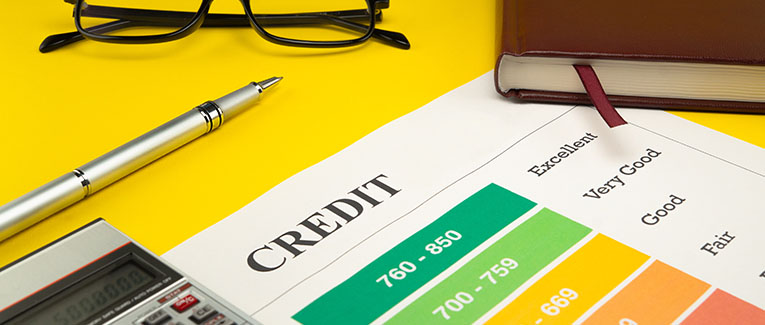
Here’s the short take on your credit score: This three-digit number will impact every aspect of your future in the U.S. From financial dealings to buying a car or a house, a lot hinges on your credit score.
What exactly is a credit score? How can you calculate it? And what are the dos and don’ts for maintaining it?
We demystify all these questions in this guide.
What is a Credit Score?
Your credit score is a three-digit number calculated by a scoring agency to determine your credit profile. There are two rating systems in the U.S., one developed by FICO and the other by VantageScore. Both have slightly different calculation methods but use the same factors while rating.
How Does It Work?
All of your credit-based transactions are tracked by three credit reporting bureaus: Equifax, Experian, or TransUnion. This information is then used to create your creditworthiness profile, aka your FICO score or VantageScore.
You need to disclose your credit score while applying for a loan. The lender will decide whether to accept your application and what interest to charge you based on your credit rating.
What Goes into Calculating Your Credit Score?
It might seem like an opaque, hard-to-decipher process, but it is essential to understand how your credit score is determined. Be aware of these main factors so that you can work on improving your score.
- Payment history: Have you defaulted on your payments (35% of your score)
- Credit utilization: What is your balance-to-credit ratio? (30%)
- Age of your account: How long is your credit history? (15%)
- Recent credit activity: Have you applied for multiple loans? (10%)
- Credit mix: Do you have student loans, car loans, mortgage on a house, etc.? (10%)
Everything from your health insurance payments, rent settlements, cash withdrawals, etc., goes into building your credit score.
What is a Good Credit Score?
Now that you know how your credit score is calculated, the natural question arises: What is a good credit score to have?
Rating agencies make predictive analyses about your personal credit activities and put you in one of these credit score bands.
FICO credit score range:
- Very poor: 300 to 579
- Fair: 580 to 669
- Good: 670 to 739
- Very good: 740 to 799
- Excellent: 800 to 850
You should have a “good” to “excellent” score to have your loan requests accepted and to get lower interest rates.
Not just that, a good credit score means extra benefits for you. You are eligible for better credit cards, cashback offers, travel benefits, and luxury payment benefits once you establish a healthy credit rating.
Dos and Don’ts of Improving Your Credit Score
Now for the crucial part. What can you do to maintain a high credit score?
- Be punctual with your payments: Your repayment history is the biggest determining factor of your credit score. So, paying your bills on time gives a huge boost to your rating. For your personal credit, avoid defaulting on EMI payments, credit card debt, rent payments, etc. If you have institutional debt for your business, keep a check on your cash flows, and regularly pay off the loan installments.
- Maintain a healthy balance-to-credit ratio: Having a credit card can be tempting; you get to buy something without worrying about paying for it at that instant. However, this can drive up your credit utilization and put a dent in your credit score. The more credit you use, the higher your accumulated debt. Your potential lenders will see this as a higher chance of default. The ideal credit utilization is around 30% of the credit card limit.
- Don’t close your old credit cards: A longer credit history translates into a better credit age. Since credit age accounts for 10% of your credit score, it is a good idea to keep old credit cards open. Don’t deactivate them, because once the credit bureaus delete the account history, your average credit age will drop significantly.
Also, closing a credit card reduces your total available credit. Since your goal is to maintain a 30% credit utilization ratio, it is best to maximize your available credit. If you drop a card from your credit basket, you will shoot yourself in the foot by upsetting your balance-to-credit ratio.
- Improving your account mix: There are two types of accounts that the rating agency looks at:
- Installment accounts: Loan accounts for personal, auto, home loans, etc. You pay EMIs from these accounts.
- Revolving account: These are accounts for which you hold a credit card. The credit limit is replenished every month once you clear the payments for the last cycle.
Maintaining both types of accounts shows the rating agency that you can handle your debt and credit lines. Keep a good mix of both for improving your credit score.
- Don’t rack up credit inquiries: Do your research well before applying for a loan at a bank or NBFC. Too many rejections on your account can take 5 to 10 points off your credit score. What is the rationale behind this? When the credit rating agency sees a loan rejection, it assumes that lenders do not trust your repayment abilities. This gets reflected in a lower credit score, starting a vicious cycle that you definitely do not want to find yourself in.
Lump your credit inquiries within a 14–45-day period—this way, all your applications can be claimed as a single inquiry.
- Always keep a tab on your credit report: Your credit report is a detailed document that records your past credit history. FICO or VantageScore uses this report to predict your future credit activities. Read your credit report regularly to make sure that it is accurate and to find potentially concerning trends.

